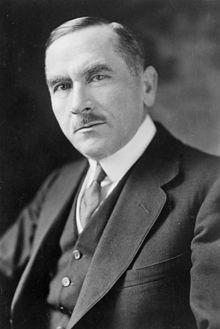
Back رومان دموسكى ARZ Раман Дмоўскі Byelorussian Раман Дмоўскі BE-X-OLD Роман Дмовски Bulgarian Roman Dmowski Czech Roman Dmowski German Ρόμαν Ντμόφσκι Greek Roman Dmowski Esperanto Roman Dmowski Spanish رومن دمووسکی Persian
Roman Dmowski | |
|---|---|
 Dmowski c. 1919 | |
| Minister of Foreign Affairs | |
| In office 27 October 1923 – 14 December 1923 | |
| President | Stanisław Wojciechowski |
| Prime Minister | Wincenty Witos |
| Preceded by | Marian Seyda |
| Succeeded by | Karol Bertoni (Acting) |
| Member of the State Duma of the Russian Empire | |
| In office 1907–1909 | |
| Personal details | |
| Born | 9 August 1864 Kamionek, Kingdom of Poland |
| Died | 2 January 1939 (aged 74) Drozdowo, Poland |
| Resting place | Bródno Cemetery, Warsaw |
| Political party |
|
| Alma mater | University of Warsaw |
| Signature | |
| Part of a series on |
| Conservatism |
|---|
 |
Roman Stanisław Dmowski (Polish: [ˈrɔman staˈɲiswaf ˈdmɔfski], 9 August 1864 – 2 January 1939) was a Polish politician, statesman, and co-founder and chief ideologue of the National Democracy (abbreviated "ND": in Polish, "Endecja") political movement. He saw the Germanization of Polish territories controlled by the German Empire as the major threat to Polish culture and therefore advocated a degree of accommodation with another power that had partitioned Poland, the Russian Empire. He favoured the re-establishment of Polish independence by nonviolent means and supported policies favourable to the Polish middle class. While in Paris during World War I, he was a prominent spokesman for Polish aspirations to the Allies through his Polish National Committee. He was an instrumental figure in the postwar restoration of Poland's independent existence. Throughout most of his life, he was the chief ideological opponent of the Polish military and political leader Józef Piłsudski and of the latter's vision of Poland as a multinational federation against German and Russian imperialism.
Dmowski never wielded significant political power except for a brief period in 1923 as Minister of Foreign Affairs. Nevertheless, he was one of the most influential Polish ideologues and politicians of his time. A controversial personality most of his life, Dmowski desired a homogeneous, Polish-speaking and Roman Catholic-practicing nation as opposed to Piłsudski's vision of Prometheism, which sought a multi-ethnic Poland reminiscent of the Polish–Lithuanian Commonwealth. As a result, his thinking marginalized other ethnic groups living in Poland, particularly those in the Kresy (which included Jews, Lithuanians, and Ukrainians), and he was regarded as anti-Semitic. He remains a key figure of Polish nationalism,[1] and has been frequently referred to as "the father of Polish nationalism".[2][3]
Cite error: There are <ref group=lower-alpha> tags or {{efn}} templates on this page, but the references will not show without a {{reflist|group=lower-alpha}} template or {{notelist}} template (see the help page).
© MMXXIII Rich X Search. We shall prevail. All rights reserved. Rich X Search